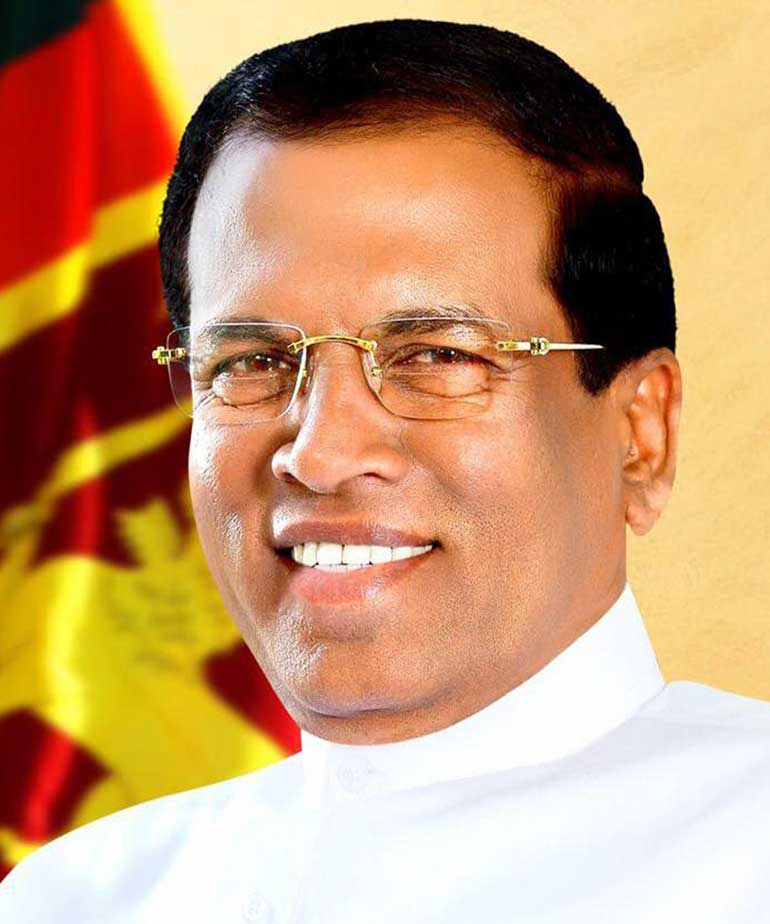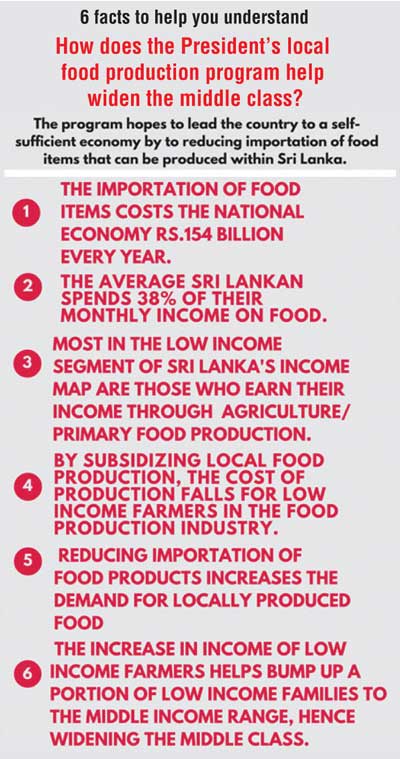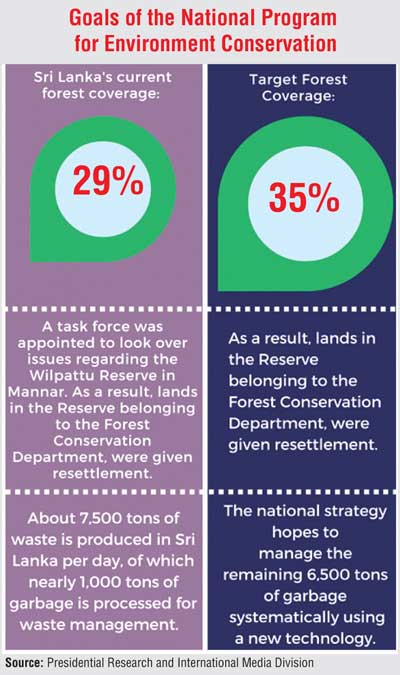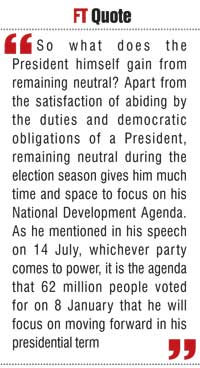Friday Feb 20, 2026
Friday Feb 20, 2026
Monday, 10 August 2015 00:00 - - {{hitsCtrl.values.hits}}

President Maithripala Sirisena
By Thisuri Wanniarachchi
With party politics, political campaigns and election violence, many have lost sight of the fact that there are great strides being made with the President’s national development agenda. Those who have been very critical of the President during the days leading up to his speech on 14 July, remain quiet in times of progress.
Perhaps they had spoken too much of him in the days leading up to his speech, and since he has decided to remain neutral in the election, maybe there isn’t much dramatic complaints about him; and where there is no drama there is no talk. Hence the public silence.
In this silence, you may wonder what the president is really up to. What does he gain out of remaining neutral? Should a politician really remain neutral during a crucial national election? These questions have been salient components of most political dialogues in Sri Lanka during the past month. Here’s your answer: Presidents of all democracies are expected to remain neutral during elections, although this has not been the norm in the past.
The country has much to gain from his neutral position. This is the first election in Sri Lankan history where a President has been this adamant about making sure state resources and powers are not exploited by candidates for their campaigns.
So what does the President himself gain from remaining neutral? Apart from the satisfaction of abiding by the duties and democratic obligations of a President, remainingneutral during the election season gives him much time and space to focus on his National Development Agenda. As he mentioned in his speech on 14 July, whichever party comes to power, it is the agenda that 62 million people voted for on 8 January that he will focus on moving forward in his presidential term.
It is crucial that we, the public know what this agenda is and what part of it is currently in progress. Instead of petty political gossip, this is what we need to be talking about. This agenda has the power to make drastic changes to our country’s future, i.e. our future.
This article will explore the four main sustainable development initiatives of the President’s National Development Agenda that are currently in progress, and how they could help widen and strengthen the middle-class.
As of right now, the President’s National Sustainable Development Agenda looks at three main national programs: The Local Food Production Program, The Anti-Narcotics program and The National Environment Conservation Program.
The Chronic Kidney Disease Prevention Program is an initiative which deals with the causes and outcomes that affect all three of the above national programs. More importantly, it addresses a national health crisis that needs our utmost attention.
These four initiatives that are currently in progress address four of the several extremely humane issues that Sri Lanka faces today.

The local food production program
At a recent meeting the President pointed out that his ambition was to stop the importation of every food item that could be produced within Sri Lanka and lead the country to a self-sufficient economy.
President Sirisena revealed that the country was spending about Rs. 154 billion every year for the importation of food items. He pointed out that almost every food item, with several exceptions, could be produced within the country.
This program hopes to subsidise local farmers and cut down food imports. While reducing imports may seem like an extreme protectionist measure, in order to revitalise the poverty-stricken farming community and help them climb up to the middle-income category, this measure is very important.
This program also looks at ways of increasing food production while efficiently using agricultural lands and the need of implementing a strategy to make it obligatory to cultivate lands that are not being cultivated currently was emphasised during this meeting.
The following are the key objectives of the National Food Production Program.
1)To increase the production and productivity of rice, other field crops, fruits and vegetables.
To ensure food and nutritional security in the country.
To reduce the cost of importing agricultural commodities and enhance sectoral contribution to the GDP.
To Introduce and implement a agro-ecological zonal-based crop production program.
2)To popularise modern technologies, machinery and to facilitate development-oriented crop research.
3)To assure the availability of good quality input for producers and to assure the availability and safety of food to consumers.
4)To promote agribusiness and encourage private-public partnerships.
5)To ensure the environmental friendliness of agricultural practices.
The foreign currency saved through cutting down food imports could be utilised for imports in the education, healthcare and national security sectors.

The Environment Conservation Program
Deforestation, environmental damage, environmental degradation, natural resource damage, soil erosion and the lack of proper garbage disposal systems are some of the major environmental issues that will be addressed through this program. As of today, Sri Lanka’s forest coverage is 29%, the proposed project is expected to increase the forest coverage to 35% within the first few years.
The program ensures the setup of a proper system for garbage disposal in Sri Lanka. About 7,500 tonnes of waste is produced in Sri Lanka for a day, of which nearly 1,000 tonnes of garbage is processed for waste management. The remaining 6,500 tonnes of garbage is expected to be managed systematically using the new technology.

The antinarcotics program
Research shows that one-third of Sri Lanka’s low-income families spend a substantial portion of their monthly income on cigarettes, drugs and alcohol. Also 22% of the national health budget is spent on patients with smoking-related ailments. As a result of President Sirisena’s antinarcotics initiative, a law was passed in 2015 to make it compulsory to display advisory images on all packs of cigarettes sold in Sri Lanka.
The program aims at:

National Strategy for CKD Prevention
About 1,000 Sri Lankans die from CKD annually. There are 40,680 registered CKD patients as of now.
The lack of access to clean drinking water has been identified as one main reason for kidney disease. Even though the facilities in hospitals throughout the country were improved to treat the kidney patients, the rising number of kidney patients led to various difficulties.
The President’s National Strategy to Prevent CKD involves a Presidential TaskForce, which includes specialists in the field for research and implementation and Brand Ambassodors Muttiah Muralitharan and T.M Dilshan, who will communicate the campaign to the public.
The President recently spoke to the Sri Lankan diplomatic community about the need for international support to strengthen this initiative.
The ambassadors expressed their willingness to give their full support to Sri Lanka to overcome this crisis, while admiring the humanitarian aspect of the President as a Statesman. The representative of the World Health Organization extended support to further investigate the causes of the illness. The EU representative stated the organisation would increase the donations for drinking water projects in Sri Lanka.
China will build a $ 100-million specialised hospital to treat a mysterious kidney disease that is striking mainly rice farmers in Sri Lanka. The Chinese High Commissioner said that water samples from affected areas were now being studied at the Chinese Academy of Science to identify the actual cause of the disease and that China would continue to collaborate with Sri Lanka to fight CKD.
Indian High Commissioner Y.K. Sinha said that the water projects in Polgahawela, Kundasale and Kalutara would be supported by India, while the Japanese Government agreed to make donations for 60,000 kidney patients in Anuradhapura.
The Australian High Commissioner said they would extend the support to launch a drinking water project benefiting 100,000 people in the North.
Most victims of CKD belong to low-income families. Prevention of CKD is not merely the prevention of a health hazard. It’s also a measure to reduce poverty by strengthening the agricultural industry and families depending on it, which can help broaden the middle-class.
(Thisuri Wanniarachchi is the State Literary Award Winning author of novels Colombo Streets and The Terrorist’s Daughter. She is anundergraduate student of Bennington College studying Political Economy with a focus on Education Reform and is currently interning at the Research and International Media Division of the Presidential Secretariat)